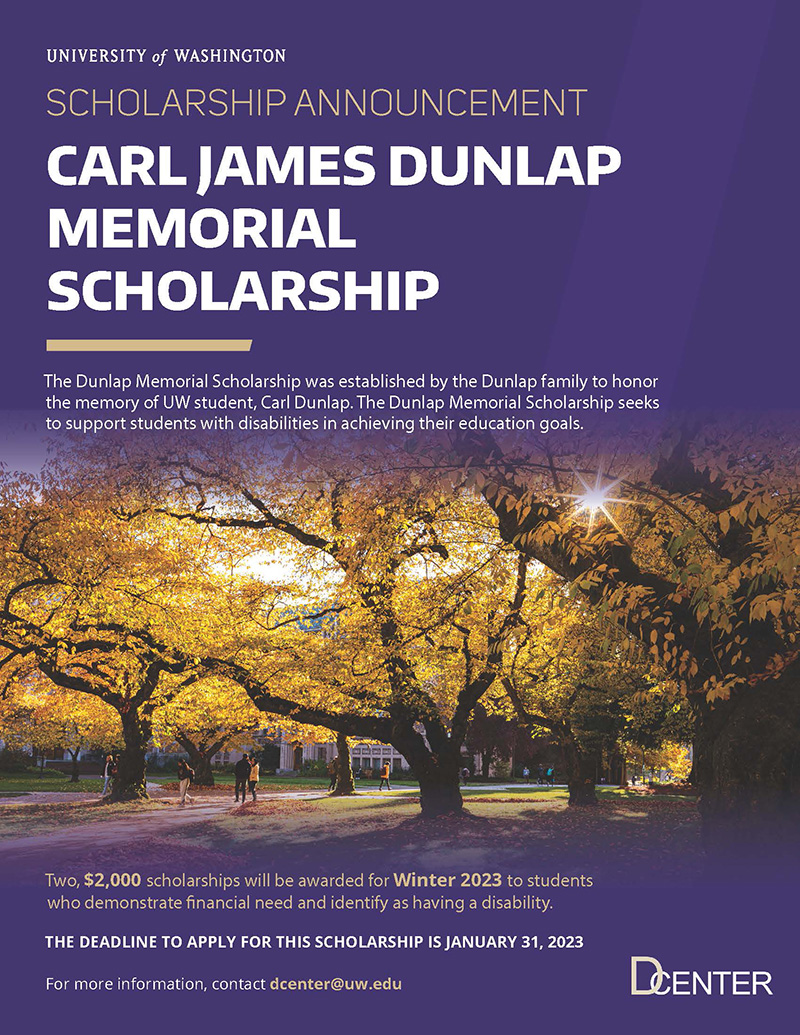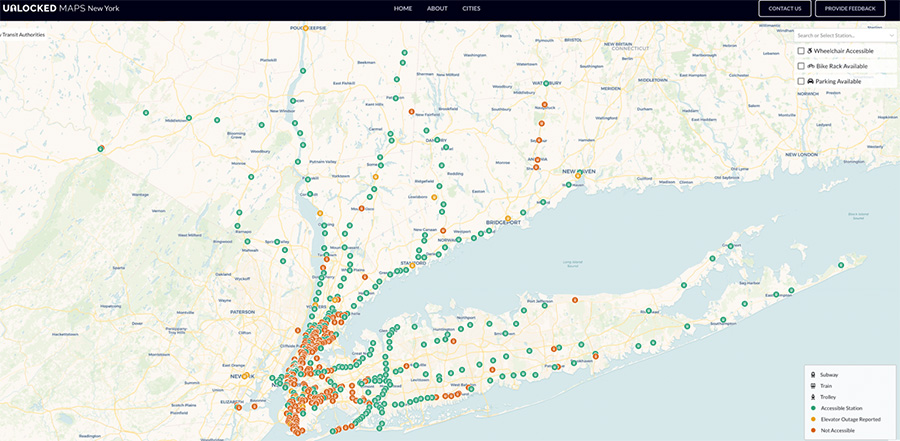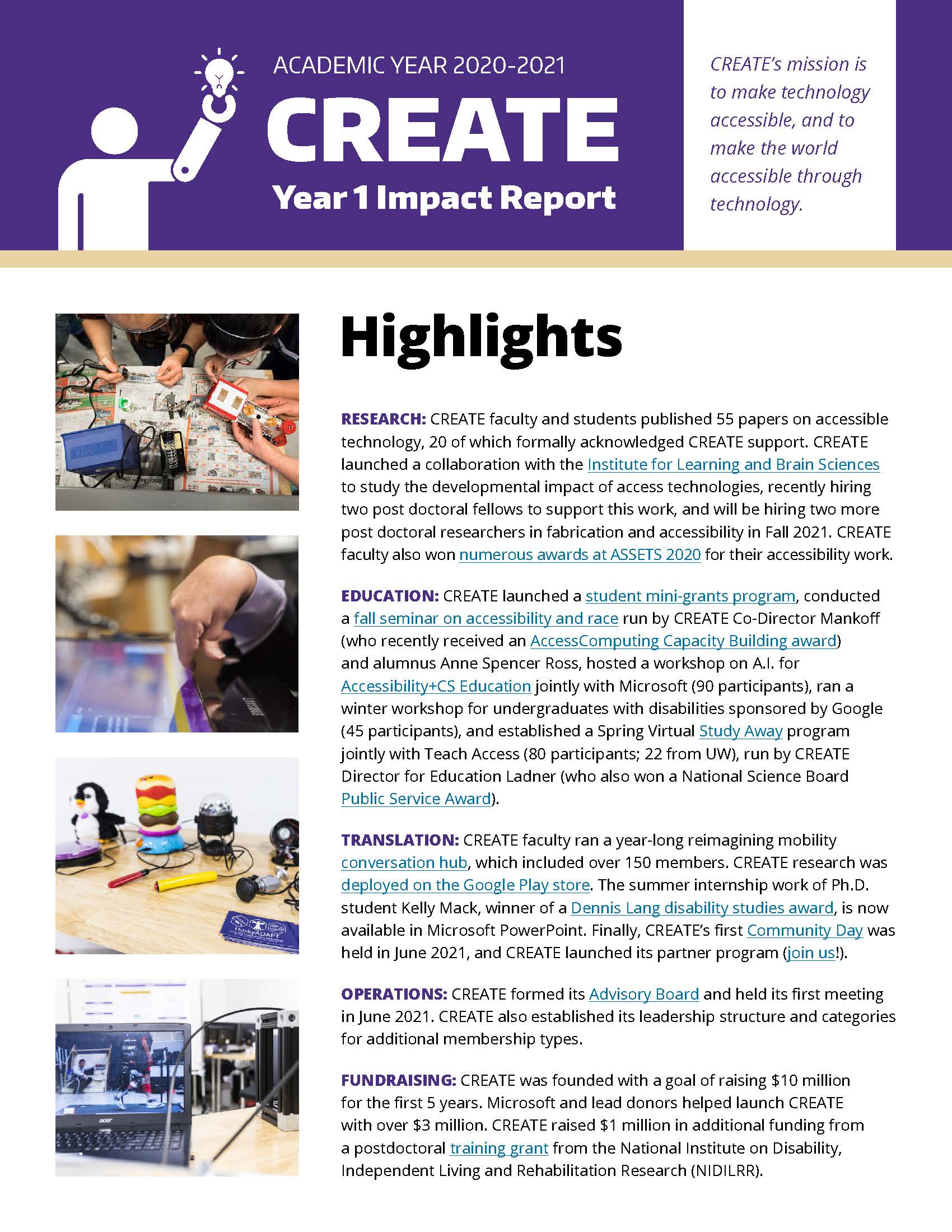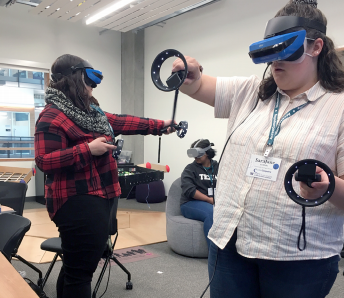CREATE welcomes our newest Advisory Board member, ChrisTiana ObeySumner. ObeySumner (they/them) is the CEO and principal consultant of Epiphanies of Equity, a social equity consulting firm specializing in change management, social and organizational psychology, intersectional equity and liberation, and disability justice. For two decades, they’ve dedicated their life and career to exploring and practicing innovative approaches to achieving social equity – in other words, how to sustainably and effectively bring parity to areas of disparity so “humans can human with…
Category: Announcements
CSE course sequence designed with “accessibility from the start”
March 8, 2023 The CSE 121, 122, and 123 introductory course sequence lets students choose their entry point into computer science and engineering studies, whatever their background, experience, or confidence level. And, as part of the effort to improve diversity, equity, inclusion, and accessibility (DEIA), the courses were designed with “accessibility from the start.” A member of the course development team was a dedicated accessibility expert, tasked with developing guidelines for producing accessible materials: using HTML tags correctly, providing alt…
Honoring Judy Heumann’s outsized impact
Judy Heumann — disability activist and leader, presidential advisor to two administrations, polio survivor and quadriplegic — passed away on Saturday, March 4. Heumann’s family invited the community to honor her life at a memorial service and burial that is now available on video with ASL, captioning, and English interpretation of Yiddish included. Who was Judy Heumann? Judy Heumann fought for disabled rights and against segregation. She led the “longest nonviolent occupation of a federal building in American history,” according to the New…
Postdoctoral Fellowship application open: Accessibility researcher in physical computing and fabrication
CREATE and UW departments are looking for a postdoc researcher to investigate using fabrication and physical computing technologies to address accessibility.
Jacob O. Wobbrock awarded Ten-Year Technical Impact Award
January 5, 2023 The Association for Computing Machinery (ACM) has honored CREATE Co-Director Jacob O. Wobbrock and colleagues with a 10-year lasting impact award for their groundbreaking work improving how computers recognize stroke gestures. Wobbrock, a professor in the Information School, and co-authors Radu-Daniel Vatavu and Lisa Anthony were presented with the 2022 Ten Year Technical Impact Award in November at the ACM International Conference on Multimodal Interaction (ICMI). The award honors their 2012 paper titled Gestures as point clouds: A $P recognizer…
Rory Cooper, CREATE Advisory Board member, receives IEEE Biomedical Engineering Award
Congratulations to CREATE Advisory Board member Rory Cooper on receiving the 2022 IEEE Biomedical Engineering Award! For more than 25 years, Cooper has been developing technology to improve the lives of people with disabilities and his inventions have helped countless wheelchair users get around with more ease and comfort. Cooper’s first innovations in mobility were a modification to the back brace he wore after a spinal cord injury left him paralyzed from the waist down, then a better wheelchair, then an electric-powered version that…
Carl James Dunlap Memorial Scholarship

University of Washington student Carl James Dunlap had a powerful impact on the UW community with his vibrant personality and persistent advocacy for students with disabilities. To honor his legacy, the Dunlap family established the Carl James Dunlap Memorial Endowment. The Dunlap Memorial Endowment seeks to support students with disabilities encountering unique challenges when attending and completing higher education. The D Center is grateful to further Carl’s legacy by awarding two $2,000 Carl James Dunlap Memorial Scholarships to UW students…
UnlockedMaps provides real-time accessibility info for rail transit users

Congratulations to CREATE Ph.D. student Ather Sharif, Orson (Xuhai) Xu, and team for this great project on transit access! Together they developed UnlockedMaps, a web-based map that allows users to see in real time how accessible rail transit stations are in six metro areas including Seattle, Philadelphia (where the project was first conceived by Sharif and a friend at a hackathon), Chicago, Toronto, New York, and the California Bay Area. Shown here is a screenshot of UnlockedMaps in New York. Stations that are…
CREATE Contributes to RFP on Healthcare Accessibility
The Agency for Healthcare Research and Quality (AHRQ) requested public comment about comprehensive, longitudinal, person-centered care planning for people with Multiple Chronic Conditions (MCC). CREATE contributed to a disability justice-focused response that highlights nine recommendations: Read the full response (PDF).
Accessible teaching strategies
CREATE faculty member Stephanie Kerschbaum has contributed to a set of guidelines to help UW faculty plan, design, and adapt their teaching around students’ needs. “Accessibility is about recognizing that access is a complex, relational configuration as people move and share space together. Accessible teaching requires us to be in conversation with and responsive to our students.” – Stephanie Kerschbaum, UW professor and disability studies scholar The guidelines include general strategies such as anticipating students’ needs and using technology that supports…
Jen Mankoff receives SIGCHI Social Impact Award
Congratulations to CREATE Co-Director Jennifer Mankoff! She has been awarded a 2022 Social Impact Award by SIGCHI, the special interest group of the Association for Computing Machinery (ACM) for professionals, academics and students interested in human-technology and human-computer interaction (HCI). Mankoff was cited for research focused on accessibility to give people the voice, tools and agency to advocate for themselves. “She strives to make change at both structural and individual levels. For example, her recent work on fabrication of accessible…
CREATE Submits RFI on Disability Bias in Biometrics
CREATE’s response to the Science and Technology Policy Office’s request for “Information on Public and Private Sector Uses of Biometric Technologies”
CREATE Co-Director Jacob O. Wobbrock Named ACM Fellow
We congratulate CREATE Co-Director Jacob O. Wobbrock on being named an ACM Fellow by the Association for Computing Machinery for his contributions to human-computer interaction and accessible computing! Wobbrock’s research seeks to understand and improve people’s interactions with computers and information, especially for people with disabilities. He is the primary creator of ability-based design, which scrutinizes the ability assumptions embedded in technologies in an effort to create systems better matched to what people can do. CREATE profile Faculty page For this…
Year 1 Impact Report

A whirlwind year of accessible technology research, education, collaboration, fundraising and recognition is highlighted in CREATE’s Year 1 Impact Report.
Go Baby Go Car Adaptation Workshop
UW Go Baby Go, co-directed by CREATE Associate Director Heather Feldner, is excited to announce its fall workshop where we will build ten Go Baby Go cars for local children with disabilities and their families! UW and CREATE students, postdocs, and faculty (especially from engineering, computer science, and rehab programs), local clinicians, and parents/caregivers are all encouraged to attend. Saturday, November 6, 2021 * Workshop: 8:30 a.m.-2 p.m. * Family car fittings and pickup: 2-4 p.m. UW Rehab Medicine, BB tower…
Help make the WSDOT website more accessible
Anthro-Tech is looking for people who use screen readers and other assistive technology to participate in a usability study on the Washington State Department of Transportation (WSDOT) website redesign. During a study session, the facilitator will show the participant the new website and ask them to use it to complete a few tasks. Sessions will take place on Zoom for 60-90 minutes and participants receive a $100 check as a thank you. Learn more and sign up at WSDOT Website Study: Call for participants.
Recruiting for Tactile Map Participants
UW researchers are seeking participants for a paid study. Who: People who are blind or low vision who use a screen reader and are 18 years or older.What: Participants will be asked to test 3D-printed tactile maps. Sessions are 60 minutes. For details, see the signup survey.Where: UW Seattle campus.When: August.Compensation: $40 and a travel stipend.How: Contact Kelly Mack at kmack3@cs.washington.edu or fill out the signup survey.
CREATE Research Showcase – Spring 2021
Schedule of events for the 2021 CREATE Research Showcase. Open to the public, CREATE faculty and students share research in accessibility.
Accessible CS Education workshop focuses on inclusive experiences
Amid a global pandemic, innovative thinkers have been hard at work developing plans to improve equity in modern learning environments. The Accessible Computer Science Education Fall Workshop was held November 17-19, 2020, and jointly sponsored by Microsoft, The Coleman Institute for Cognitive Disabilities, and CREATE. Each day of the event focused on strategies to improve classroom experiences for students and faculty with disabilities. You can watch recorded sessions where speakers provided a wide range of perspectives on computer science pedagogy…
Research Workshop for Undergraduates with Disabilities

CREATE and UW AccessComputing co-sponsored a 3-day research-focused workshop for undergraduates in computing fields who have disabilities.